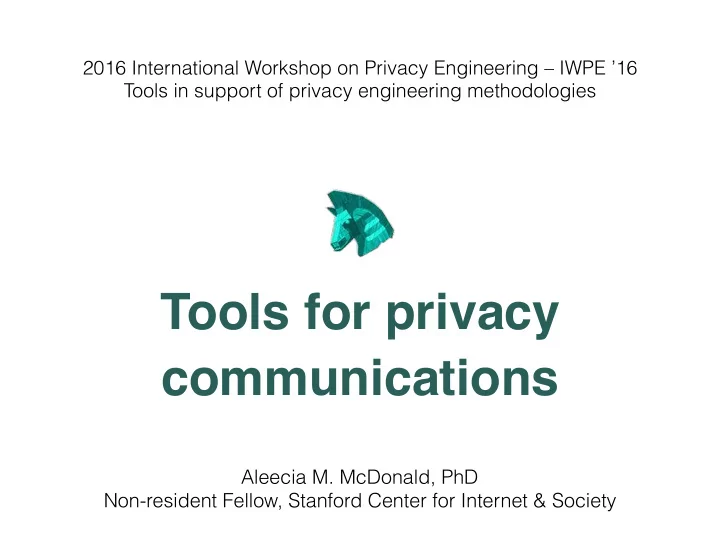

2016 International Workshop on Privacy Engineering – IWPE ’16 Tools in support of privacy engineering methodologies Tools for privacy communications Aleecia M. McDonald, PhD Non-resident Fellow, Stanford Center for Internet & Society
Privacy Communications, Part I Meeple image Creative Commons licensed. Thanks, Phil Romans, https://flic.kr/p/7xST3U
Privacy Polices The big idea: reduce information asymmetries to support optimal privacy via self-regulation Blanket permission for non-commercial use, thanks Randall Munroe, http://xkcd.com/501/
Privacy Policies: Impractical • To skim just first party • Value of time estimates privacy policies per year • $2,200 per person • 154 hours per person • $492 billion nationally • 34 billion hours • More than spent on nationally broadband connections • About the same as time spent surfing the web With L. F. Cranor. The Cost of Reading Privacy Policies . I/S: A Journal of Law and Policy for the Information Society (2008).
Privacy Policies: Incomprehensible • 9 basic questions, 6 policies • Mturk far off from the experts for financial data (40% median • Mturk level of agreement with experts) • Law & public policy grad students • Where policies were silent, • Privacy Experts experts interpret a practice is • Within groups, Mturk and Expert permitted; students say unclear agreement was moderate; student agreement substantial • If a policy claims a company (Fleiss’ Kappa statistical test) “may” engage a practice, experts see it as permitted and students split Reidenberg, Joel R., Breaux, T. D., Cranor, L. F., French, B., Grannis, A., Graves, J. T., Liu, F., McDonald, A. M., Norton, T. B., Ramanath, R., Russell, R. C., Sadeh, N., and Schaub, F. Disagreeable Privacy Policies: Mismatches Between Meaning and Users' Understanding. Berkeley Technology Law Journal , 30(1), May 2015, 39-88.
Blobs of Text Are Not Designed for Web-scale Tools • Step 0: find the privacy policy • Could do natural language processing… • …if humans could agree on gold standard truth! • Hard to innovate for automated tools to help users navigate privacy policies • So instead, we mess with the formats
Many Years Spent on Attempted Solutions • Privacy policies as icons; “creative commons for privacy” • Privacy policies as XML (P3P / compact P3P / Privacy Bird) • Seals from TRUSTe and Better Business Bureau • Layered policies • Nutrition labels for privacy are great, but missing data One problem: companies have no incentive to be clear
Mobile Policy Tools
Decent for Basics % correct % incorrect % unsure 100% 90% 80% 70% 60% 50% 40% 30% 20% 10% 0% TRUSTe Privacy Choice Natural Language TRUSTe Privacy Choice Natural Language TRUSTe Privacy Choice Natural Language TRUSTe Privacy Choice Natural Language TRUSTe Privacy Choice Natural Language App location 3rd party share Custom ads Retain > 6 mo.s Aggregate shared McDonald, A. M., and Lowenthal, T. Nano-Notice: Privacy Disclosure at a Mobile Scale. Journal of Information Policy , Vol. 3 (2013), pg. 331-354.
Privacy Communications, Part II Meeple image Creative Commons licensed. Thanks, Phil Romans, https://flic.kr/p/7xST3U
Do Not Track: A Polite Request for Privacy All major browsers let users send a DNT request Technically simple: HTTP header Modest server-side implementation. Most user DNT requests just ignored.
Do Not Track for EU? Requirement DAA Opt W3C DNT EFF EFF DNT & Out DNT Privacy alone Badger | Disconnect | AdBlock Consent by opt No Yes (varies No Yes in? by country) Limits PII Maybe Maybe Yes Yes collection? (varies by (varies by company) company) Consent before No Yes Yes Yes cookies set? Can revoke? Yes Yes Yes Yes ✓ Meets all 4 X ? X Zuiderveen Borgesius, F. J., and McDonald, A. M. (2015). Do Not Track for Europe. 43rd Research Conference on Communication, Information and Internet Policy (Telecommunications Policy Research Conference) September 26, 2015.
Ad Blockers: When “Please” Has Failed • Most users are ok with ads for free content, not ads + data (McDonald, A. M., and Cranor, L. F. Americans’ Attitudes About Internet Behavioral Advertising Practices. Proceedings of the 9th Workshop on Privacy in the Electronic Society (WPES) October 4, 2010.) Of people not ad blocking, what would change their minds? • 50% - personal data misused to personalize ads • 41% - quality of ads increased • 10% - marketers don’t improve targeting • 11% - N/A, would never install Adobe and PageFair, The Cost of Ad Blocking (2015). <https:// downloads.pagefair.com/wp-content/ uploads/2016/05/2015_report- the_cost_of_ad_blocking.pdf>
Ad Blockers: When “Please” Has Failed Of people who use AdBlock Plus, why? Important or somewhat important: • 90% - distracting animations / • 75% - missing separation between sounds ads and content • 84% - better page load time / • 72% - offensive / inappropriate ad reduced bandwidth content • 82% - security concerns • 48% - ideological reasons • 82% - privacy concerns Wladimir Palant, Adblock Plus user survey results [Part 2], November 7, 2011 <https:// adblockplus.org/blog/adblock-plus-user-survey-results-part-2>
Wrap Up • Consent underpins EU law, yet we have pretty poor privacy communications in both directions between companies and users • We can do better! • Not intractable • Tools must be usable for engineers, and usable for users • Standards would help; role for regulators & laws
Recommend
More recommend